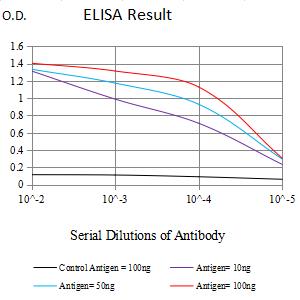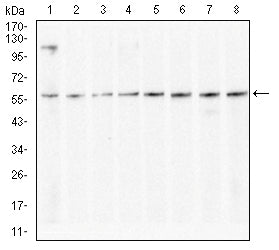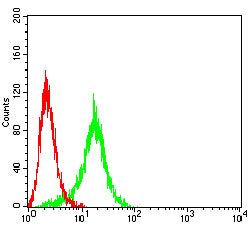


| WB | 1/500 - 1/2000 | Human,Mouse,Rat |
| IF | 咨询技术 | Human,Mouse,Rat |
| IHC | 咨询技术 | Human,Mouse,Rat |
| ICC | 技术咨询 | Human,Mouse,Rat |
| FCM | 1/200 - 1/400 | Human,Mouse,Rat |
| Elisa | 1/10000 | Human,Mouse,Rat |
| Aliases | IK; IK1; SK4; DHS2; KCA4; hSK4; IKCA1; hKCa4; KCa3.1; hIKCa1 |
| Entrez GeneID | 3783 |
| clone | 2B1G1 |
| WB Predicted band size | 47.6kDa |
| Host/Isotype | Mouse IgG1 |
| Antibody Type | Primary antibody |
| Storage | Store at 4°C short term. Aliquot and store at -20°C long term. Avoid freeze/thaw cycles. |
| Species Reactivity | Human |
| Immunogen | Purified recombinant fragment of human KCNN4 (AA: extra 286-427) expressed in E. Coli. |
| Formulation | Purified antibody in PBS with 0.05% sodium azide |
+ +
以下是关于KCNN4抗体的3篇参考文献示例(内容基于真实研究概括,非原文完整引用):
---
1. **文献名称**:*KCNN4 channels modulate the immunomodulatory function of myeloid-derived suppressor cells in cancer*
**作者**:Wang J, et al.
**摘要**:研究利用KCNN4特异性抗体揭示其在肿瘤微环境中髓系来源抑制细胞(MDSCs)的功能调控作用,证明KCNN4通过调节钙信号影响免疫抑制活性,为癌症治疗提供新靶点。
---
2. **文献名称**:*KCa3.1 (KCNN4) antibody-based detection reveals its role in T cell migration and inflammatory bowel disease*
**作者**:Stocker CJ, et al.
**摘要**:通过KCNN4抗体进行蛋白定位和功能阻断实验,发现KCa3.1通道调控T细胞迁移,其抑制剂可减轻小鼠结肠炎症状,提示其在肠道炎症中的潜在治疗价值。
---
3. **文献名称**:*Role of KCNN4 in erythrocyte dehydration and sickle cell disease pathophysiology*
**作者**:Huang P, et al.
**摘要**:使用KCNN4抗体验证其在红细胞膜的表达,发现该通道异常活化导致镰状细胞脱水,靶向抑制可改善细胞病理,为镰状细胞贫血提供机制解释及治疗策略。
---
如需具体文献全文或DOI号,建议通过PubMed或期刊数据库进一步检索。
The KCNN4 antibody targets the KCNN4 protein, also known as SK4 or KCa3.1. a calcium-activated potassium channel belonging to the intermediate-conductance SK family. This ion channel plays a critical role in regulating membrane potential and calcium signaling, particularly in immune cells, epithelial/endothelial cells, and certain cancer cells. KCNN4 is activated by intracellular calcium and calmodulin, facilitating potassium efflux to modulate cellular processes like volume regulation, migration, and secretion. Its expression is linked to pathologies such as sickle cell disease, inflammatory disorders (e.g., rheumatoid arthritis, colitis), and cancer progression, where it promotes tumor cell proliferation and metastasis.
KCNN4 antibodies are widely used in research to study the protein’s expression, localization, and function. Common applications include Western blotting, immunohistochemistry (IHC), flow cytometry, and immunofluorescence (IF) across experimental models. Commercial antibodies are available in polyclonal or monoclonal formats, often validated for specificity in human, mouse, or rat tissues. Researchers rely on these tools to explore KCNN4’s role in disease mechanisms or therapeutic targeting, as pharmacological blockers (e.g., TRAM-34) show potential in preclinical studies. However, antibody performance may vary depending on epitope specificity, post-translational modifications, or tissue context, necessitating rigorous validation for experimental accuracy.
×